A Grave for Two Read online
Page 16
A wildlife camera.
Not of the modern type, with remote control, GPS and software that meant the owner could sit anywhere in the world watching what was going on. This edition was simple, she saw, and was stamped with the Public Roads Administration logo. She supposed it had been set up with a view to tracking the movement of wild animals across the road that bisected the Maridalen valley, with abundant wildlife on both sides. The red and yellow logo was almost worn away. The cable ties holding the camera fastened to the spruce trunk, on the other hand, looked new.
Selma glanced yet again towards the road.
Someone had started singing. More and more people joined in. A psalm, she presumed, at least it was slow and sombre enough. It didn’t look as if anyone had noticed her little detour. She was clearly visible from the gathering down there. So she moved behind the tree to avoid being so easily discovered. After fishing out a bunch of keys from her pocket, she began to saw through the plastic ties.
The camera was state property.
A couple of minutes later, it was lying on the ground.
Now, in other words, it was abandoned goods. A camera on a frozen forest floor: she should take it with her and deliver it to its rightful owner. She would most certainly do that. After having a closer look at it, admittedly. She put the camera in her pocket. There was just enough space. Almost silently, she descended to the road again, crossed the ditch in a single bound and then sneaked the camera out of her pocket and into her bag.
Bottolf Odda had started speaking on the other side of the crowd.
‘If we could all just let the service bus pass,’ he said in a loud voice, ‘then our bus will come down from Skar shortly to pick us up. In the same groups as we arrived, please. We thank you all for coming, and wish to announce that the funeral will take place on Friday at 11 a.m. in the Trefoldighets Church.’
In silence, people began to follow his instruction. The fittest moved beyond the ditch on the lower side. The rest spread out along the edge of the road, and it took only a couple of minutes for the number 51 bus to set off again. Conspicuously slowly, as if the driver wanted to pay his last respects.
Selma jogged northwards and knocked on the bus door. The driver hesitated. Staring at her with scepticism that a moment later dissolved into a smile of recognition. With a low sigh, the bus door opened.
‘Thanks.’ Selma gave a sad smile as she clambered aboard. ‘There were so many of us.’
‘No problem. Is he with you?’
Selma didn’t have a chance to answer before a man’s voice behind her said: ‘Yes, I’m with her.’
The door slid shut. Selma sat down in the middle of the almost-empty bus. A tall, slim man collapsed into the seat beside her, smiling as he touched his forehead with two fingers.
‘Lars Winther here. Journalist with DG Sports. What are you actually planning to do with that wildlife camera you just stole?’
THE REALIZATION
Once again he attempted to concentrate on the motive.
Why he was sitting there.
Was standing there. Why he was lying there, on this hard bunk, or why he had been left to go to the toilet over a grate that was now stinking out the whole cell. He jogged occasionally. Along the walls, around in a small circle, his feet were sore from the rough underlay, and he could not for the life of him understand what he had done wrong. His balls were smarting: they were damp and had broken out in a red rash.
It was a long time now since he had received any food. Bizarrely enough he was hungry, though he had never felt the need for food in here. He had eaten just because he knew that he must. Thirst was never a problem. Although the trickling hole was ever so disgusting, the water that came out of it was fresh and cold. Food was delivered so seldom that he had actually managed to swallow down most of it. A few hours ago he had gobbled down a slice of bread from yesterday, with liver paté that had hardened at the edges and tasted of cod liver oil. Now there was nothing left.
The consolation was that it was just as long since the machine had been switched on.
The room was still square.
He thought about women. There had been many of them. They never stayed long. Once or twice they had been the ones to leave, but as a rule he had been the one to become bored. Not all the break-ups had been particularly dignified. A couple of them had been downright brutal, on reflection. To the best of his knowledge, however, he could not imagine having done anything to deserve a punishment like this.
A wicked hellhole such as this cell. At his age it was impossible not to have fallen out with anyone in the course of his life. A couple of colleagues, maybe, but never any really serious rift. A neighbour, he remembered now, involved in a furious row about the siting of a garage. The conflict had nearly landed up in court, but he had chosen to sell his childhood home and move to an apartment before it reached that stage.
The person who had put him in here knew of his worst nightmare.
Even though he had mentioned his phobia to the New York Times, he had refused to talk about it here at home.
He had been naïve.
The person who had kidnapped him must hate him.
After perhaps forty rounds of the little room – he had to change direction every other time to avoid becoming dizzy – he lay down on the bunk. Closed his eyes.
That was when it dawned on him.
The incident he had tried to forget for so long. He had forgotten.
Everyone had forgotten what had happened.
The fear that raced through him was so intense that he fainted. When he woke, he realized he was going to die.
THE WILDLIFE CAMERA
Selma Falck really had no choice.
Lars Winther had agreed to postpone discussion of the wild-life camera’s fate until the bus trip was over, but only if they could then find a coffee bar where they could sit down and talk. Of course she could ignore him, go home and lock her door, but in that case he would alert the police. At least that was what he threatened to do.
Selma considered taking a chance. She could easily come up with a credible story about why she had taken the camera. She was on a good footing with the police, and they would have more faith in her than a sports journalist. The downside of such a solution was however obvious: Lars Winther would know that she was lying. He had by all accounts seen her cut down the apparatus. No journalist should have such a hold on her. So she had given her mumbled consent and then spent the precisely twenty minutes of silence on the bus trying to formulate a plan.
When at last they were sitting in Starbucks in Nydalen, each with a big cup of black coffee, she still hadn’t come up with anything.
‘We can watch it together,’ Lars suggested.
‘Here? Now?’
Selma took a sip of her coffee.
‘I suppose so, or we could go somewhere else.’
He scanned the room. The place was almost deserted. The barista was bored to death, and an old woman with a trolley bag was struggling to make up her mind about something to eat.
That took some time.
‘What would we actually be looking for?’ Selma asked.
The journalist raised his eyebrows in a condescending grimace.
‘Seriously? Shall we start with that, then?’
‘The camera was more than thirty metres away from the spot where Haakon had his accident. The filming won’t be activated by movement at such a far distance.’
‘That depends how it’s set up. Let me have a look at it.’
He held out an open hand.
‘No. And it’s a basic camera. Belonging to the roads authority. Believe me, it’s triggered by movement within ten metres. Maximum. Five, maybe.’
Lars Winther kept his hand held out. Impatiently.
‘So? Don’t fool around. Let’s look at it. How can you know what kind of wildlife camera this one is?’
‘I’m a hunter. Are you?’
He smiled for the first time since, uninvited, he had sat down beside h
er on the bus.
‘That too, I see. What do you hunt?’
‘Hunted, past tense. Big game. For years and years. Gave up eight to ten years ago.’
‘Why?’
‘I no longer found it exciting.’
At last he withdrew his hand. Drank some coffee, wriggling restlessly in his chair.
‘This is getting too silly,’ he said. ‘We’re both after the same thing.’
‘Are we?’
‘Yes. We both find it pretty astonishing that the world’s best athlete on skis should die in this way. How many hundreds of kilometres had this guy put behind him on roller skis?’
‘Many,’ Selma replied. ‘And he fell a few times, too.’
‘Exactly! They sometimes fall. They hurt themselves. Get a few scratches here and there. Dislocate a shoulder, maybe. But die from their injuries? Come off it.’
He held out his hand again.
‘It hasn’t got a screen,’ Selma told him, as she picked up a stick sachet of sugar, tore it open and let the sugar drizzle into her coffee cup.
‘It has to be connected to a computer,’ she added. ‘It might even be password protected.’
‘Let’s try it, then.’
Lars Winther grabbed his shoulder bag, placed it on his knee, opened the catch and took out a small laptop. From a side pocket he produced a cable.
‘Shall we?’
Selma stirred her coffee, following the swirling black liquid with her gaze, all the while wondering what choices she had. They were getting fewer by the minute. Without a word, she suddenly put her hand into her own bag.
‘Here,’ she said, placing the wildlife camera on the table without letting go of it. ‘We’ll check. With one clear proviso.’
‘Which is?’
‘If there’s anything here with any significance for Haakon’s death, then I’m the one to decide what we do.’
‘I’m a journalist and it’s obvious I can’t enter into any agreement of that kind.’
Selma gave a broad smile.
‘You journalists enter into agreements all the time, Lars. You twist and turn whatever way suits you, piling on pressure, making threats and pulling the wool over people’s eyes. Don’t try that on me.’
‘Well, we don’t …’
Suddenly he checked himself and raised his hands in surrender.
‘OK. You decide. Within reasonable limits.’
She hesitated for a moment before nodding, still gripping the camera.
‘Do you know how it works?’
‘Er … yes, in principle.’
‘Passive infrared detection,’ she elaborated all the same. ‘PIR. The principle of wildlife cameras is based on the fact that all objects have a temperature that generates infrared radiation. That’s a kind of invisible light, you might say. A spruce tree normally has a lower temperature than, for example, a bear. Are you with me?’
He nodded impatiently.
‘A PIR consists principally of a sensor, a special lens called a Fresnel, and a circuit board with a relay to activate the camera. When something that is warmer than its surroundings is detected, then it switches …’
‘I get that. When an animal passes within a certain distance, the camera switches on.’
‘Yes. An animal. Or a human. Close up. I can guarantee it won’t start filming because a roller skier whizzes past thirty metres away.’
‘I understand that,’ Lars said, increasingly impatient. ‘Then it would whir and buzz all the time, triggered by cars and buses and cyclists and … Shall we link it up?’
‘We don’t even know if the battery’s working. And if there are videos or images here at all.’
Selma was still holding her hand protectively over the camera. She studied Lars Winther as he fired up his laptop. He was tall and muscular and his long legs barely fitted underneath the table. His skin was taut over his cheekbones, and his eyes were uncannily blue. When he was ready, he asked yet again for the wildlife camera.
This time he got it.
With accustomed movements he connected it to the laptop.
‘Hah!’ he said, raising two fingers in a V. ‘No password, great.’
It took him three minutes to gain entry to the camera. Selma pushed her chair closer to him. A gang of boisterous school pupils entered the café. Ostensibly from senior high school, but they could well have been in the final year of junior high. All girls. Blonde, and every one of them with a ponytail. Their clothes were all identical, and at least five had light-coloured Timberland boots on their feet.
They could have been octuplets.
‘The images are date stamped,’ Lars said.
‘Of course they are. They’re of little value otherwise.’
The chair scraped on the floor as Selma moved even closer.
‘Friday 8 December,’ Lars murmured. ‘In the evening.’
His fingers pecked at the keyboard.
‘Here!’
A picture flickered. First in black, then grey. After a few seconds the wet, ashen landscape emerged more clearly.
‘A …’
Lars leaned nearer to the screen and lowered his voice.
‘A lynx? Bloody hell, that’s a lynx. Do they come so close to the city?’
‘Yes. A couple of years ago I read about someone in Bøler who had a visit from one on their verandah.’
‘The time is 20.27,’ Lars read, pointing at the clock.
The lynx moved gingerly, slowly. It came from above, obliquely from the right in the image. Approximately halfway, it stopped. Looked straight at the camera. It approached, sniffing so close to the lens that the picture grew foggy for a moment. It came closer and lingered at the left, lower corner of the picture. The camera was directed down along the course of the stream, where no trees hindered the view of the road.
The lynx was still sharply delineated, maybe five or six metres away. The road down there was, however, out of focus. It was dark, and only a streetlight made it possible to see anything at all.
A figure emerged from the north on roller skis.
A car emerged from the same direction.
When the car passed, the man was gone.
‘Stop,’ Selma said, so loudly that all the teenagers spun around to look at them.
Some of them sniggered. They had ordered plain mocha coffees and had chosen to sit at the table furthest away from them in badly concealed antipathy. None of them had recognized Selma, which despite her shock at what she had just seen, she didn’t entirely appreciate.
‘What the hell …’
Lars wound back. His fingers raced over the keyboard now, and after a couple of minutes he had discovered how they could view the film frame by frame.
His forefinger moved the cursor.
A shapeless figure entered the field of vision. The speed and the lack of depth of focus in the picture would have made it difficult to guess what it was, if they hadn’t already known.
Lars pressed again. The vague shape was now completely within the frame.
Yet another frame. And another. Three more.
He pressed once per second. Tap. Tap.
There.
A car moved in towards the man from behind. The type and colour were impossible to identify, but it didn’t look terribly large. They sat watching the same image, in silence. For a long time.
‘Click,’ Selma said tersely.
The car was on its way up beside Haakon. It looked as if it swerved to overtake him.
‘Haakon is skating,’ Lars said softly. ‘So he’s using the larger part of the road.’
Selma had experienced that many times herself, on her way in her car up towards the car park at Skar. The diagonal striders were easy to pass, the skaters were provocative wide boys. In both meanings of the word.
‘The car should have braked,’ Selma said, leaning even closer to the screen. ‘Go back. All the way to the frame where the car comes into sight.’
Lars Winther complied.
‘Start,’
Selma commanded. ‘Frame by frame.’
They both saw it in the same split second.
By moving the image forward slightly faster than last time, it became an almost continuous movement of the car’s trajectory.
It accelerated towards Haakon.
When the car first entered the picture, it braked. Before it reached the man on the roller skis, the driver increased his speed.
‘It accelerates too early,’ Lars whispered. ‘In a situation like that you have to brake first, and then wait for the skier to stop skating and move to the side, The road is quite simply not wide enough for two in that particular stretch.’
‘No. That applies in almost all of Maridalen. Click.’
Another image. Then more. Six more.
Lars pointed: ‘Haakon swings his pole at the car. Before it comes all the way up alongside him. He’s annoyed.’
Yet another image. Seven more.
‘He’s furious,’ Selma said. ‘He’s hitting out as hard as he can.’
Lars Winther clicked his way onwards. The car disappeared out the left-hand corner of the picture. Haakon was no longer anywhere to be seen.
The lynx lingered for a while, watching. It seemed as if it sniffed the air, even though it was difficult to tell. It stood with its short tail facing the wildlife camera. A few minutes later, it began to move towards the road.
The picture went black. There was no longer any heat in the camera’s search field.
The video was over.
‘Bloody hell.’
Lars Winther stared at her open-mouthed.
‘He was killed,’ he snarled angrily, as if Selma were to blame.
‘Maybe just the victim of an accident.’
‘Accident? That car speeded up! And if it was an accident, why didn’t he stop? He must have noticed that … Were there … Were there bite marks on the corpse? Was he gnawed at? By the lynx?’
Selma placed a reassuring hand on his arm.
‘No. Definitely not. And the police need to have this camera. As fast as possible. The question is how.’
‘How? It’s just a matter of handing it in!’
Smiling, Selma canted her head. Looked him straight in the eye. They were really amazingly blue, with long, dark lashes.

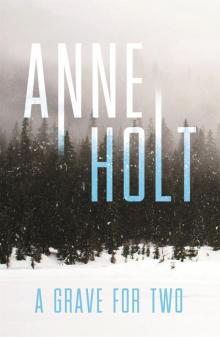 A Grave for Two
A Grave for Two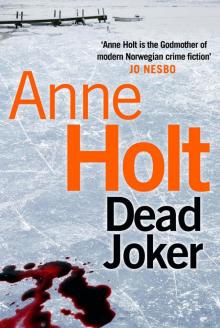 Dead Joker
Dead Joker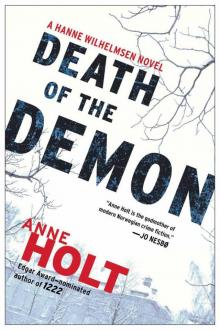 Death of the Demon: A Hanne Wilhelmsen Novel
Death of the Demon: A Hanne Wilhelmsen Novel Punishment aka What Is Mine
Punishment aka What Is Mine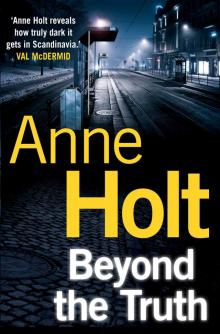 Beyond the Truth
Beyond the Truth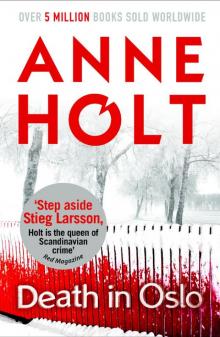 Death in Oslo
Death in Oslo The Blind Goddess
The Blind Goddess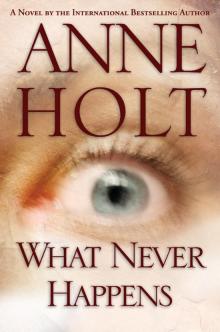 What Never Happens
What Never Happens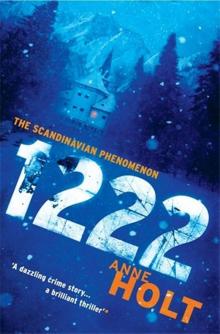 1222
1222 In Dust and Ashes
In Dust and Ashes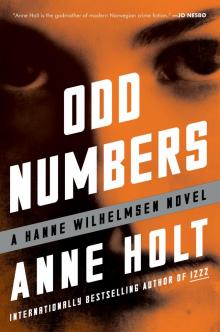 Odd Numbers
Odd Numbers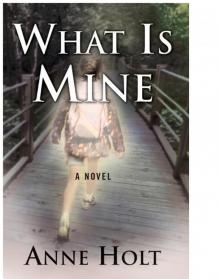 What is Mine
What is Mine What Dark Clouds Hide
What Dark Clouds Hide Blessed Are Those Who Thirst
Blessed Are Those Who Thirst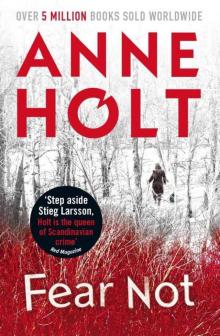 Fear Not
Fear Not No Echo
No Echo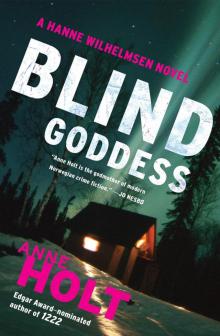 Hanne Wilhelmsen - 01 - The Blind Goddess
Hanne Wilhelmsen - 01 - The Blind Goddess